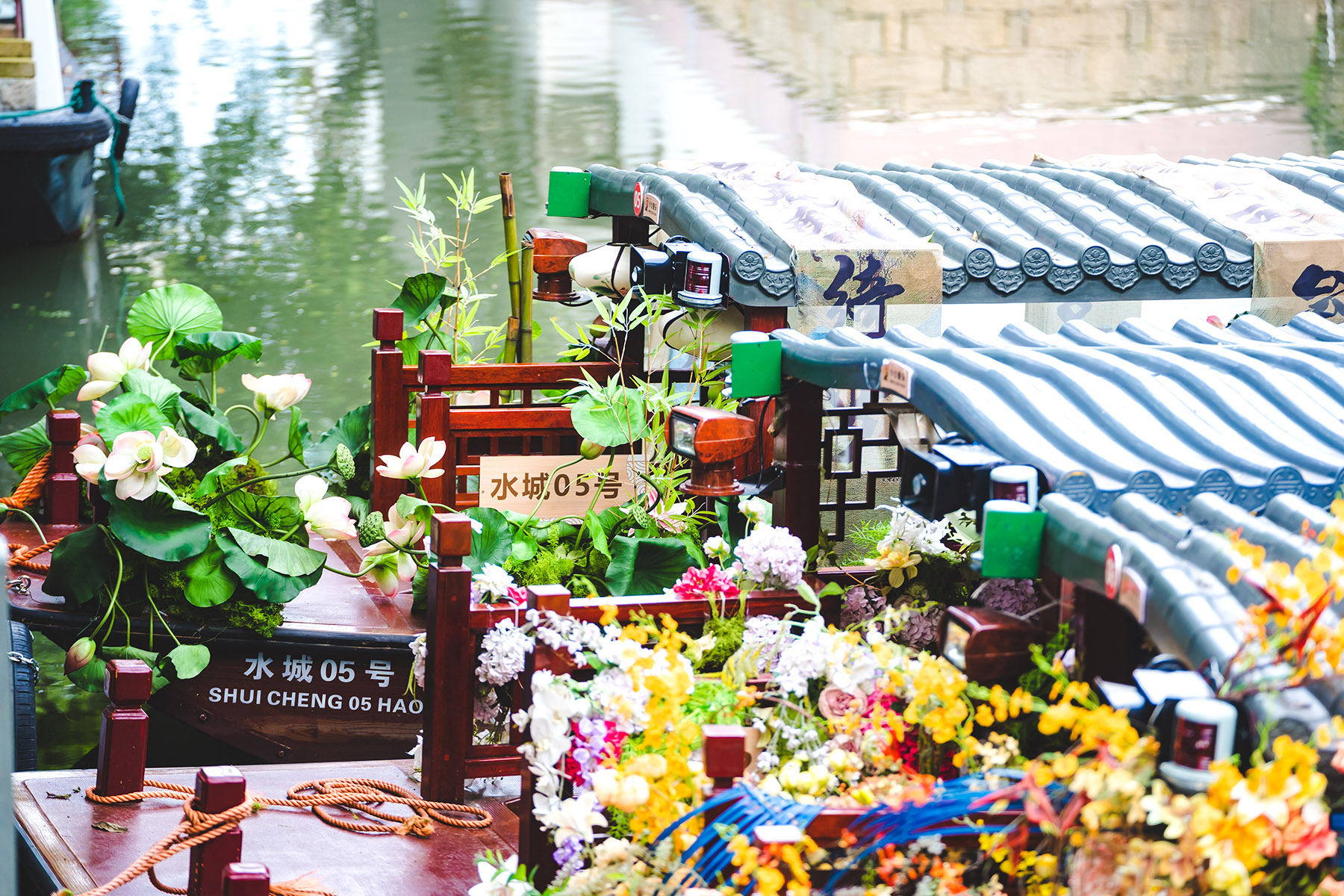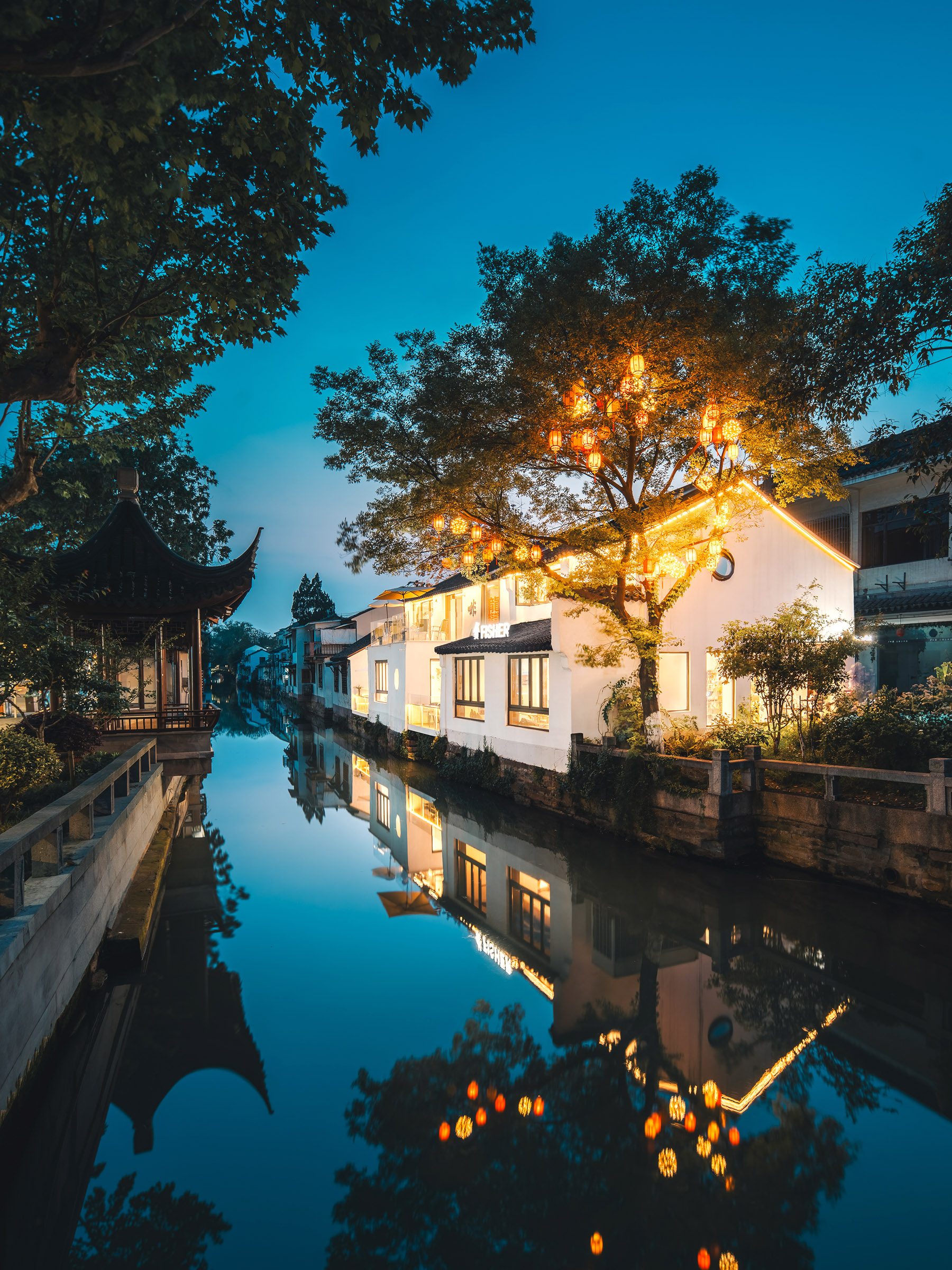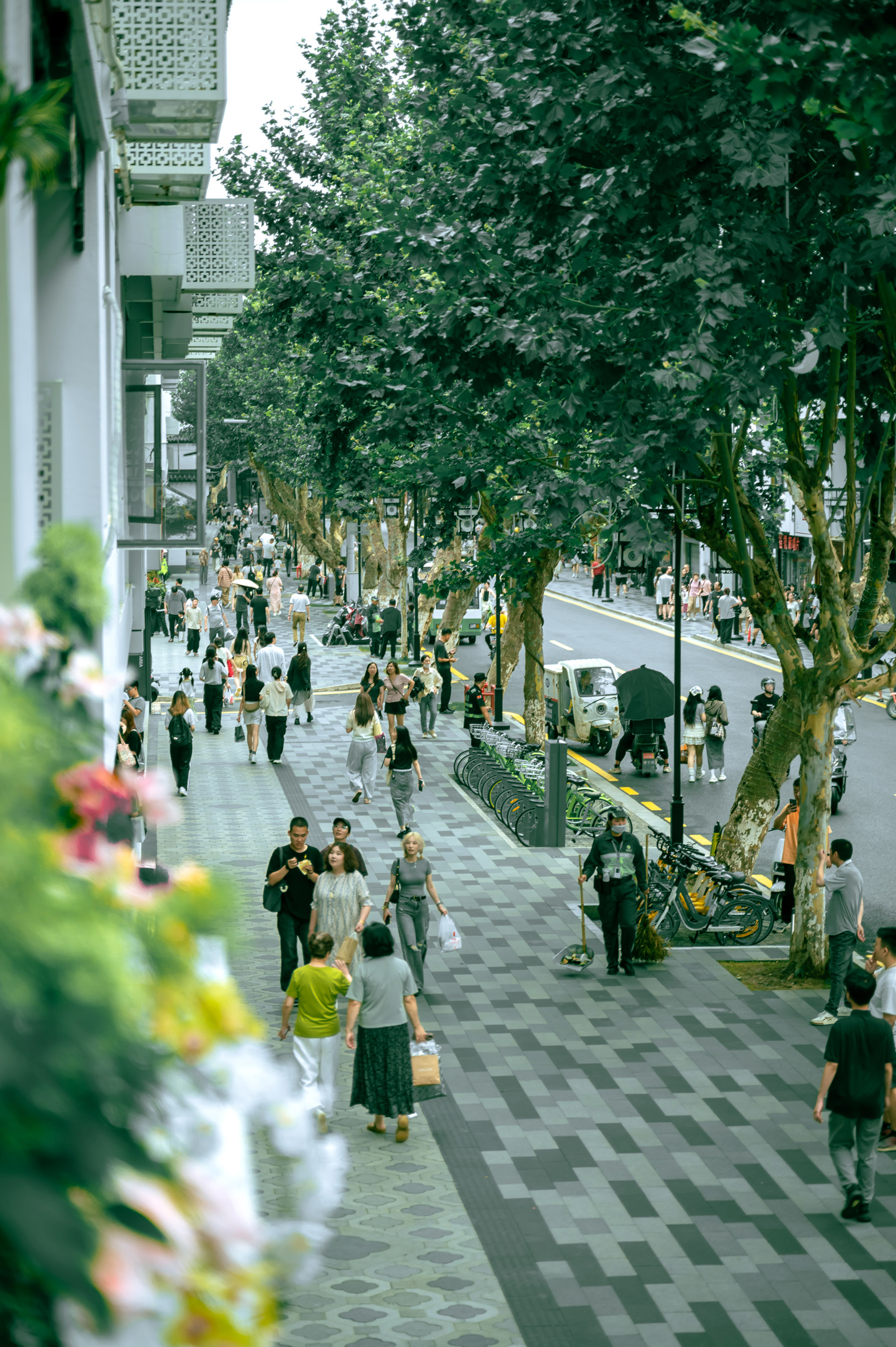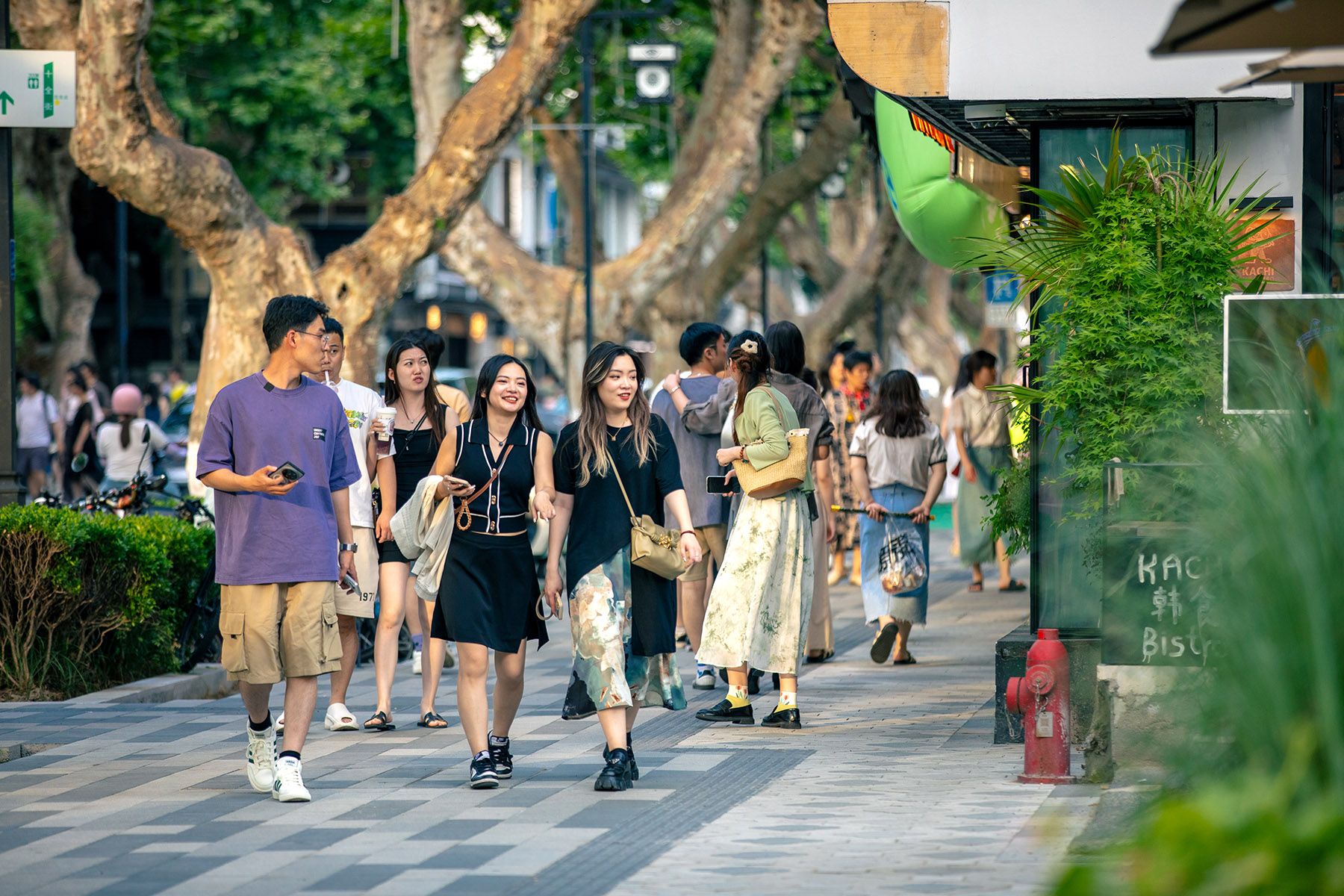Modern infrastructure gives residents and tourists a taste of elegance, Deng Zhangyu reports in Suzhou, Jiangsu.

As night falls, an outdoor movie is playing in a public area in front of the Fisher Coffee shop on Shiquan Street in Suzhou, Jiangsu province, captivating residents. Nearby, lights flicker on the river as tourists on boats lift their phones to capture the enchanting scene.
The bustling street and tranquil river, along with the harmonious coexistence of tourists and residents, bring immense joy to He Qing, founder of the coffee shop and who has lived on this street for more than a decade.
"This street is steeped in culture, yet brims with the vibrancy of everyday life. Following last year's revitalization, our needs for living, entertainment and work can all be met without leaving the area," says He.
READ MORE: Bridging the gap between now and then
Situated at the heart of Suzhou's ancient city area, Shiquan Street has been a bustling hub for centuries. Stretching 2 kilometers, it still retains the traditional layout of streets in Suzhou, where waterways run parallel to roads and streets neighbor rivers.
Classical Suzhou gardens, century-old schools, and traditional residences lie along its length.
Following the nationwide trend of old street renovations, Shiquan Street completed its transformation at the end of June last year, quickly emerging as a trendy destination that draws numerous visitors for photo ops. The quality of life for the 20,000 households residing here has also improved, according to surveys by local communities.

Thus, the street has been labeled a fashionable district that embodies the lifestyle and architectural charm of Suzhou. In March, it was recognized by the Ministry of Housing and Urban-Rural Development as a model case for neighborhood revitalization.
"I think the success of this street's renovation lies in the fact that everyone's opinions were respected. Every business owner and resident was able to participate in the renovation and management of the neighborhood," says He.
Her coffee shop was originally a traditional residence. The open space in front of it was vacant and not very clean before the renovation. During last year's renovation, she proposed the idea of taking over this public area and turning it into an outdoor cultural living room for the community, which received strong support from the neighborhood.
Now, the public area frequently hosts activities organized spontaneously by residents and business owners, such as performances by bands made up of chefs and bartenders, resident choir performances, and community book reading events. It often attracts large numbers of tourists who stop by to participate and take photos.
"The coffee shop feels like home to me and my husband; it's very cozy," she says.

Although it was already 8:30 in the evening, a few high school students were dotted around the cafe doing their homework. Residents were sipping coffee and chatting, while tourists sat on the riverside seats enjoying the night view. Occasionally, tour boats passed by, with tourists waving to the people on banks.
As the chief planner and designer of the Shiquan Street renovation, Deng Dong expresses his admiration for the leisurely lifestyle and inherent elegance of Suzhou residents.
"Residents here live with a sense of refinement, and they approach tasks with great meticulousness," says Deng, who is also vice president of the China Academy of Urban Planning & Design.
Since the beginning of this century, Deng has been involved in renovation projects in Suzhou.
He jokingly refers to himself as a "new-style Suzhou native". He describes the renovation of Shiquan Street as a successful example of people-oriented development, where residents, shop owners, and the community collaborated in construction and governance. During last year's renovation, Deng and his team spent a significant amount of time engaging in detailed communication with residents and businesses.

They gathered every individual's concerns, such as uneven roads and the lack of parking spaces for motorcycles, as well as the community's shared expectations for their neighborhood. This process also sparked enthusiasm for participation, leading residents to offer suggestions and voluntarily join renovation efforts.
"The government invested approximately 47 million yuan ($6.43 million) in the project, while businesses and institutions on the street voluntarily contributed more than 100 million yuan. Their active participation in the neighborhood's renovation represents a sustainable model for community development," says Deng.
Walking along Shiquan Street, which is lined with bakeries, cafes, trendy clothing stores and time-honored restaurants, every shop owner Deng encounters greets him warmly and invites him in, just like an old friend.
Across the river, on the other side, is a residential area.
"The people here are particularly meticulous in their work. Once my design proposal was approved, they took the initiative to implement it with a strong sense of ownership," he says, adding that Suzhou has been home to scholars and literati since ancient times. This scholarly spirit is also ingrained in the DNA of the city's residents.
In the last century, Shiquan Street was known for its international hotels, and later for its bars and jade shops. In recent years, the government has hoped to inject new vitality into the area to attract more young people.

Deng, who has worked on numerous neighborhood renovation projects across the country, says that a neighborhood is not a showcase but a place for living.
The renovation of Shiquan Street has successfully met the needs of all parties. Tourists can visit to take photos and experience Suzhou's leisurely and refined lifestyle and traditional culture, while residents can enjoy a comfortable living environment.
According to statistics compiled by Deng's team, the area now attracts an average of 20,000 visitors per day.
"In any neighborhood renovation, we must respect local culture and local people," he adds.
ALSO READ: Global students explore Suzhou's cultural depth
Ji Zhaoliang, who works at the subdistrict office responsible for the Shiquan Street area, says after the renovation, residents have been enthusiastically and actively organizing activities. During the cultural and arts season, they invite street performers, community bands, and Kunqu Opera enthusiasts to perform in public spaces in the neighborhood.
Regular intangible cultural heritage markets are held to showcase Suzhou intangible cultural heritage items, such as embroidery and woodblock prints, inviting tourists to participate. Additionally, a reading festival is organized, at which literary classics are read in the traditional houses of the neighborhood.
"The residents are highly autonomous. We work together with all residents and businesses in the area to manage the neighborhood, to ensure a bright future," says Ji.
Contact the writer at dengzhangyu@chinadaily.com.cn


